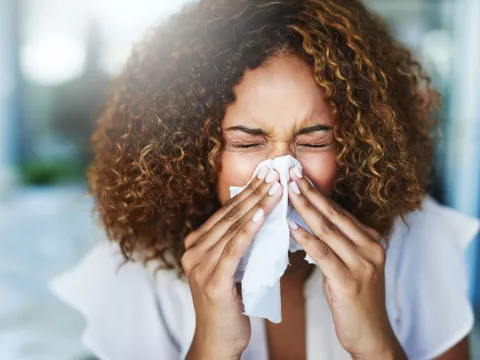- AdventHealth

You may not consider winter a season for allergies, yet it depends on your specific sensitivity and triggers. Some allergens could cause issues in the winter months when colder climates drive you to be cooped up inside for more hours every day. Before you know it, you're sneezing, wheezing and coughing.
Spring Allergies Peak: Allergies in February
In numerous regions in the United States, allergies start in February and last until the early summer. For many people, allergies tend to occur during spring and summer. Seasonal allergies, also known as hay fever or allergic rhinitis, are primarily triggered by the immune system's reaction to pollen from trees, grasses and weeds. When people with allergies are exposed to pollen, their immune system treats it as a threat, releasing histamines and other chemicals that cause allergy symptoms.
However, those with allergies might be in for an uncomfortable year if the winter climate is warmer than usual. This could cause allergies to last throughout the entire year. Allergies can affect our everyday routines, including work, child care, rest and household chores.
Winter Allergies Peak: Allergies in December
Mellow winter temperatures can make plants fertilize early. A stormy spring can likewise cause fast plant development and increase mold, making side effects last well into the fall. Many people trust that as the spring and fall seasons end, so do their allergies. However, the colder season and spending more time indoors doesn't imply that your surroundings are allergen-free. In winter, more people stay inside to keep away from the colder temperatures outside. What they may not know is that they may be affected by indoor allergens. Some seasonal triggers, such as Christmas trees or fireplaces, can add to undesirable allergens.
Symptoms of Winter Allergies
- Asthma attacks
- Congestion
- Itchy throat
- Runny nose
- Watery eyes
- Weakness
What Causes Winter Allergies?
Winters in the south are relatively warm, and recent research has shown that these warm winters increase allergy numbers. Here are some tips to help prevent or treat winter allergies rather than just waiting for the season to pass:
Dry Clothes Indoors
Make it a habit to dry your clothes in the dryer or hang them inside rather than outside. Pollen can attach to your clothes and cause an allergic reaction when you wear them later.
Prevent Mold
Mold usually grows in warmer conditions. The south has warm winters, so there's a high chance it may develop in the homes there, even in winter. Studies show that many people are severely allergic to mold and don't even know it. Mold can grow inside your walls, doors or even underneath your carpet. Consider hiring a mold removal expert to evaluate your home. Clean your garbage cans, sinks and water-based appliances with a bleach solution regularly to keep mold from building up and spreading.
Remove Blossoming Plants
If you have ragweed allergies, remove the plants in your home before they blossom to eliminate the allergens in your house. Plants can cause severe allergies and extreme sneezing.
Limit Contact With Animals
Proteins found in the animal's saliva, dander (dead skin flakes) and urine can be allergens for some people. If you or a member of your household experiences pet-related allergies, we recommend you limit your time spent at friends' and family's homes with pets.
Shower at Night
Make it a habit to shower before you go to bed. During the day, you visit different places, allowing pollen to get stuck in your hair and on your body. Going to bed before washing it off can result in your pillow and bed sheets becoming a nightly irritant.
Vacuum Frequently
Pet dander and human skin cells collect in your carpet. If they're left long enough, you could have a severe allergic reaction to them. Make sure you vacuum routinely to get rid of these particles.
AdventHealth Centra Care Can Help You With Seasonal Winter Allergies
Are winter allergies putting a freeze on your comfort? Don't let sneezing, congestion and itchy eyes keep you indoors. We're here to provide fast relief from winter allergies so you can enjoy the season to the fullest. Don't wait in discomfort; visit us today and experience the relief you deserve. Breathe freely this winter with our expert care.
At AdventHealth Centra Care, we believe health should be measured in terms of the whole person — body, mind and spirit. It's our mission and promise to help you feel whole through compassionate care and world-class expertise. Our walk-in clinics are open seven days a week, with evening hours in Central Florida, Tampa, Kansas and North Carolina. Walk-ins are always welcome, or make an online reservation.





